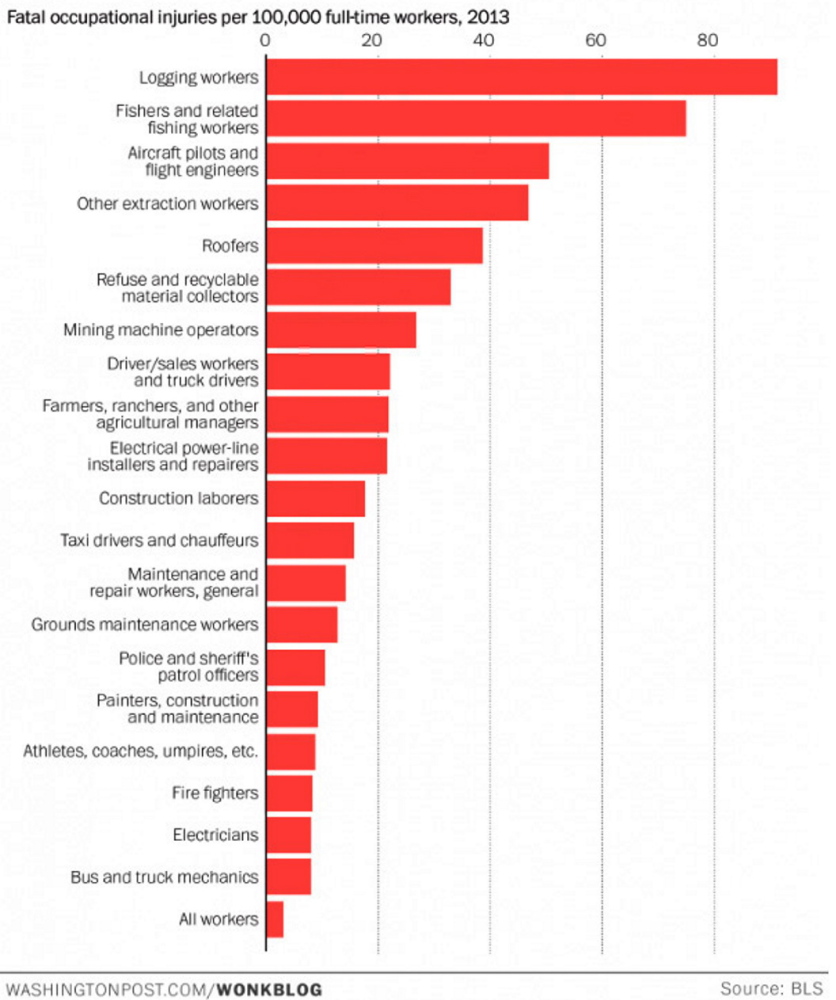WASHINGTON — From “The Deadliest Catch” to “Reno 911,” there are plenty of popular representations of Americans doing dangerous work. Yet occupations with the highest risk of death are not always the ones you hear about.
This chart shows data from the Bureau of Labor Statistics for the 20 most dangerous occupations, excluding some similar categories. Lumberjacks, fishermen and pilots run the greatest risks at work. (In Maine, 1,300 people work in logging, for an average wage of $16.40 per hour.) In general, people who work with heavy machinery, from hedge trimmers to combines, are in more danger.
Members of different professions run different kinds of risks, though. Transportation accidents account for 40 percent of all deaths on the job. Other major causes are falls (13 percent), being struck by an object or equipment (11 percent) and, disturbingly, homicides (9 percent).
People whose work involves interacting with the public are more likely to be killed by another person while working, possibly for the simple reason that they’re more likely to encounter criminals from day to day. Other research has shown that those who work odd hours, who work alone or who handle cash are especially likely to be attacked and killed on the job, even more so if their work takes them to neighborhoods where crime is high.
For these reasons, restaurant managers, taxi drivers and police are especially at risk, noted for their high rates of homicide.
Cabbies are at by far the greatest risk in this category. From 1993 to 2002, an average of 23.7 taxi drivers were killed every year per 100,000 cabbies. Thankfully, that figure has since declined to 8, according to an analysis of data from the Bureau of Labor Statistics by The Washington Post. On the other hand, the grim tally for police might be even higher if they weren’t so well trained and equipped.
Joel Neuman, who studies aggression in the workplace at the State University of New York at New Paltz, suggested that people in occupations – besides policing, in which you’re trained to deal with dangerous behavior – need to be prepared to try to defuse violent situations.
“There are a number of occupations where people find themselves in jeopardy because of the nature of their work,” Neuman said. “At least the police are trained and hopefully prepared to deal with these potential conflicts or assaults, and there are a lot of professions where people don’t receive that kind of training.”
Copy the Story LinkSend questions/comments to the editors.



Success. Please wait for the page to reload. If the page does not reload within 5 seconds, please refresh the page.
Enter your email and password to access comments.
Hi, to comment on stories you must . This profile is in addition to your subscription and website login.
Already have a commenting profile? .
Invalid username/password.
Please check your email to confirm and complete your registration.
Only subscribers are eligible to post comments. Please subscribe or login first for digital access. Here’s why.
Use the form below to reset your password. When you've submitted your account email, we will send an email with a reset code.